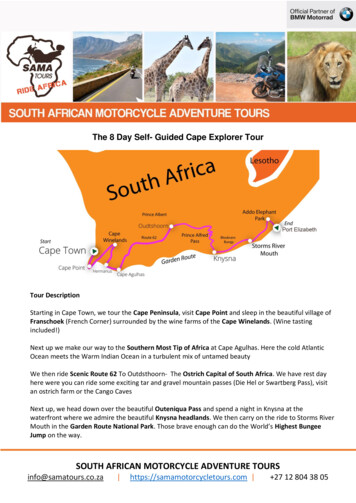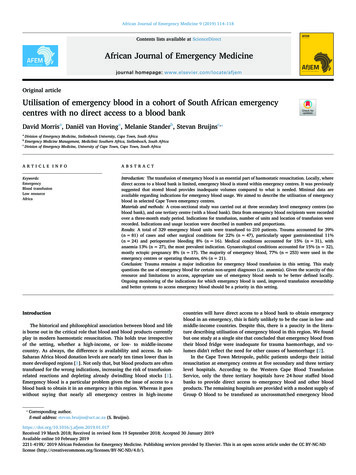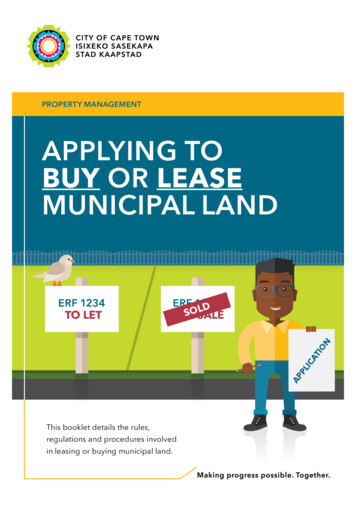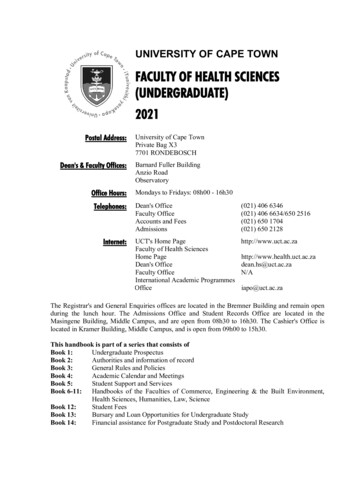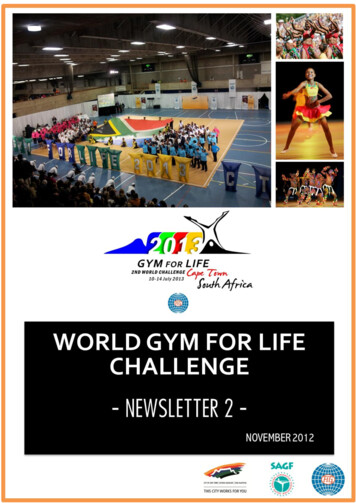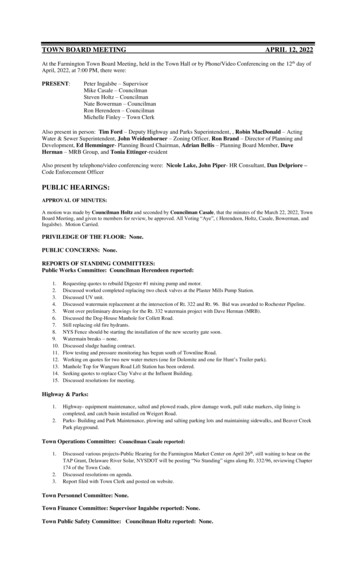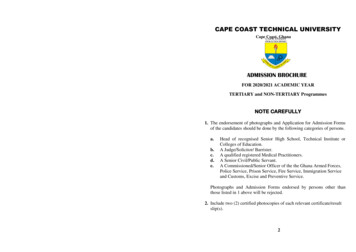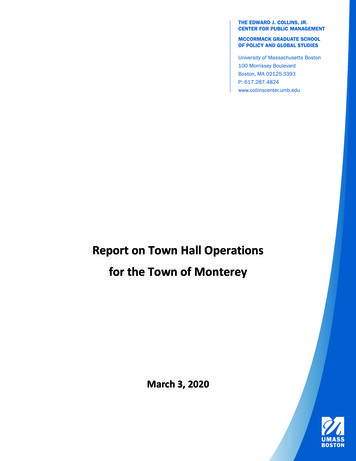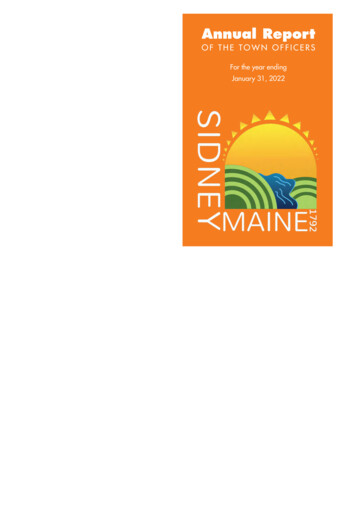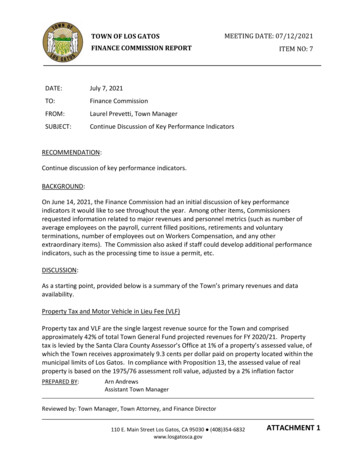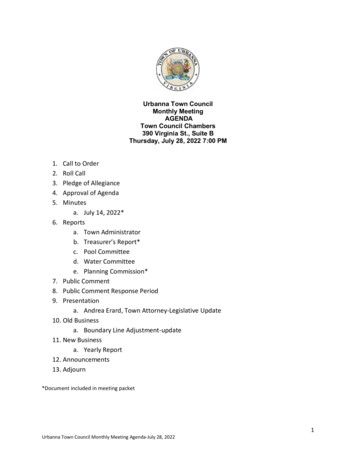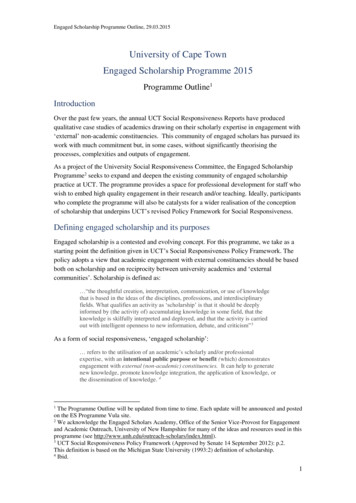
Transcription
Engaged Scholarship Programme Outline, 29.03.2015University of Cape TownEngaged Scholarship Programme 2015Programme Outline1IntroductionOver the past few years, the annual UCT Social Responsiveness Reports have producedqualitative case studies of academics drawing on their scholarly expertise in engagement with‘external’ non-academic constituencies. This community of engaged scholars has pursued itswork with much commitment but, in some cases, without significantly theorising theprocesses, complexities and outputs of engagement.As a project of the University Social Responsiveness Committee, the Engaged ScholarshipProgramme2 seeks to expand and deepen the existing community of engaged scholarshippractice at UCT. The programme provides a space for professional development for staff whowish to embed high quality engagement in their research and/or teaching. Ideally, participantswho complete the programme will also be catalysts for a wider realisation of the conceptionof scholarship that underpins UCT’s revised Policy Framework for Social Responsiveness.Defining engaged scholarship and its purposesEngaged scholarship is a contested and evolving concept. For this programme, we take as astarting point the definition given in UCT’s Social Responsiveness Policy Framework. Thepolicy adopts a view that academic engagement with external constituencies should be basedboth on scholarship and on reciprocity between university academics and ‘externalcommunities’. Scholarship is defined as: “the thoughtful creation, interpretation, communication, or use of knowledgethat is based in the ideas of the disciplines, professions, and interdisciplinaryfields. What qualifies an activity as ‘scholarship’ is that it should be deeplyinformed by (the activity of) accumulating knowledge in some field, that theknowledge is skilfully interpreted and deployed, and that the activity is carriedout with intelligent openness to new information, debate, and criticism” 3As a form of social responsiveness, ‘engaged scholarship’: refers to the utilisation of an academic’s scholarly and/or professionalexpertise, with an intentional public purpose or benefit (which) demonstratesengagement with external (non-academic) constituencies. It can help to generatenew knowledge, promote knowledge integration, the application of knowledge, orthe dissemination of knowledge. 41The Programme Outline will be updated from time to time. Each update will be announced and postedon the ES Programme Vula site.2We acknowledge the Engaged Scholars Academy, Office of the Senior Vice-Provost for Engagementand Academic Outreach, University of New Hampshire for many of the ideas and resources used in thisprogramme (see UCT Social Responsiveness Policy Framework (Approved by Senate 14 September 2012): p.2.This definition is based on the Michigan State University (1993:2) definition of scholarship.4Ibid.1
Engaged Scholarship Programme Outline, 29.03.2015Programme goals and outcomes To pilot, in 2015, a programme of workshop-seminars for building a crossdisciplinary group of staff who are interested in enhancing their own practices ofengaged scholarship and can contribute to the existing community of engagedscholarship practice, especially in relation to the University’s four strategic initiativesand other significant collective and individual innovations. On the basis of the 2015 programme, to develop a set of resources for ongoingcapacity enhancement and an expanded community of engaged scholars. Resourcesmay include a website and a manual.The intended outcomes of the 2015 pilot programme fall into two main categories: outcomesfor participants and outcomes for the University, in particular, for its strategic initiatives andsocial responsiveness mission.Participants who complete the programme will be better placed to: understand why engaged scholarship is crucial to the mission of UCT; design and implement an engaged scholarship project based on ongoing areas ofresearch and/or teaching interest; develop mutually beneficial partnerships within and beyond the university; understand, critically interrogate and apply standards of engaged scholarship; understand the nature, and challenges, of different forms of engagement; document their engaged scholarships for recognition and promotion; theorise the processes, complexities and outputs that emanate from engagement; contribute to local and international debates on engaged scholarship; assist in building a community of engaged scholars by providing leadership inengaged scholarship in their own departments or units, as well as in crossdisciplinary initiatives.Outcomes for UCT: an expanded community of engaged scholars who can contribute to deepeningengagement with external constituencies so as to advance and disseminateknowledge that addresses some of the key challenges facing society.Programme structure, content and approachAt the heart of the programme are four three-hour workshop-seminars5, interspersed withpreparatory reading, reflective work and practical applications. An interactive approach willdraw on participants’ experience and interests. Experienced engaged scholars from UCT willlead the workshops or present aspects of their work.The programme begins, in Workshop 1 (7 April), with a broad overview of the field ofengaged scholarship internationally, examining its central concepts, defining features, qualitycriteria, debates and development. Against this backdrop and through examples of engagedscholarship in action at UCT, Workshop 2 (5 May) examines the ethics and other features ofquality engagement, reflects on different forms of engagement, and considers the benefits ofengagement for teaching, research, innovation and development. We then move, in Workshop5About one week before each workshop, a detailed workshop plan will be announced and posted inResources on the ES Programme Vula site.2
Engaged Scholarship Programme Outline, 29.03.20153 (26 May), to a consideration of how institutional policy enables or constrains engagedscholarship. In the long break that follows Workshop 3, programme participants will workindependently (or in small groups) to prepare for presentation at Workshop 4: a sampleportfolio that document their current engaged scholarship or develop a proposal for anengaged scholarship project or draft a journal article on some aspects of engaged scholarship.In the second semester, participants who complete the programme will be eligible for adviceand mentoring on preparing funding proposals for projects that incorporate components ofengaged scholarship into research, teaching and/or innovation.Outline of workshops and independent activitiesSetting the scene: Preliminary readingThree papers set the scene for the programme and should be read before Workshop 1. Thefirst, by Saleem Badat (former Vice-Chancellor of Rhodes University), proposes eleventheses that will frame our discussions of engagement and its relationship to the core purposesof universities. The second and third preliminary readings provide key concepts and issues forreflection in Workshop 1. Badat, S. (2013) ‘Eleven theses on community engagement at universities’. TheSocial Responsibility of Universities: Community and Civic Engagement – Contextand Big Picture. The 4th International Exhibition and Conference on Higher Education(4-IECHE), Riyadh, Saudi Arabia, 16-19 April 2013.Boyer, E. (1990) ‘The scholarship of engagement’. Journal of Higher EducationOutreach and Engagement, 1(1:11-20).Sandmann, L.R. (2009) ‘Placing scholarly engagement “on the desk”’. The ResearchUniversities Civic Engagement Network (TRUCEN), Civic Engagement at ResearchUniversities, Engaged Scholarship trucen-toolkit/Independent activities1. Reflective journalWe encourage participants to keep a reflective journal throughout the programme. Use yourjournal to reflect on how the readings, discussions and presentations might contribute to yourown current project, or planned project, in engaged scholarship. The reflective journal is alsothe place where you might begin drafting ideas towards the assignment which you willprepare for presentation in Workshop 4. Although the journal is for your own private use,from time to time the workshop facilitators will pose reflective questions as journal prompts.2. Assignment (due 29 July 2015)For presentation in Workshop 4: Prepare a portfolio documenting your engaged scholarshipor draft an engaged scholarship project proposal or draft a journal article that theorises andreflects on aspects of your engaged scholarship. This work may be done individually or in asmall group of participants with an interest in a common topic, problem or set of externalpartners for engagement. Detailed instructions for the assignment and suggested readings willbe posted on Vula.3
Engaged Scholarship Programme Outline, 29.03.2015Workshop 1: What are ‘scholarship’ and ‘engagement’ in Engaged Scholarship?Date and tors:12:00 – 15:00 Tuesday 7 April 2015 (Arrival time: 11:45)Seminar Room, Research Office, MowbrayDVC Crain SoudienShirley PendleburyDavid CooperSonwabo Ngcelwane, Judy Favish and Shirley PendleburyOBJECTIVES/OUTCOMES To appreciate why engaged scholarship is important to the mission of the universityTo understand some ideas and complexities in relation to the concept of ‘engagedscholarship’ and appreciate its historical development over the past 15 yearsTo appreciate why ‘engaged scholarship’ must be placed ‘on the desks’ of academicsTo provide some conceptual tools for thinking about and advancing the practice ofengaged scholarship at UCTTo reflect critically on the criteria of ‘quality engaged scholarship’, with particularreference to participants’ own current and/or future proposed academic workDESCRIPTIONProfessor Crain Soudien, DVC for transformation and social responsiveness will open theEngaged Scholarship Programme and welcome the participants. His address will consider therole of engaged scholarship in transformation. A brief introduction will give an overview ofthe programme and profile the participants, and their academic fields and their currentinterests in engaged scholarship. The main presentation will explore some central ideas andcomplexities in the notion of engaged scholarship (ES), chart its development over the past 15years and provide a critical overview of some key concepts and current approaches toengaged scholarship at universities internationally. Workshop activities will examine howparticipants view their past and future academic work at UCT with reference to UCT’s currentdefinition of engaged scholarship. The workshop will conclude with an activity which seeksto classify various forms of work by UCT academics ‘as ES’ and ‘not as ES’, and whichconsiders how valued such ES work is currently at UCT.READINGSNB: Please see the detailed plan for Workshop 1 for a full list of readings to be referred to inthis workshop. You will find the plan on our Vula site in Resources.In addition to preliminary readings listed on page 3 of this Programme Outline, the followingare among the core readings for Workshop 1: Sandmann, L.R. (2008) ‘Conceptualization of the scholarship of engagement inhigher education: a strategic review, 1996-2006’. Journal of Higher EducationOutreach and Engagement, 12(1:91-104). Jordan (ed.) (2007) ‘Characteristics of Quality Community-Engaged Scholarship’,Extract, pp. 5-10, Jordan (ed.) Community-Engaged Scholarship Review, Promotion& Tenure Package. Peer Review Workgroup, Community-Engaged Scholarship forHealth Collaborative, Community-Campus Partnership for Health (CCPH).http://depts.washington.edu/ccph/pdf files/CES RPT Package.pdf4
Engaged Scholarship Programme Outline, 29.03.2015 Jordan, C.M., Seifer, S.D., Sandmann, L.R. & Gelmon, S.B. (2009) ‘Developingreview criteria’, Extract, pp. 23-24 of Jordan et al, ‘CES4Health.info: development ofa mechanism for peer review and dissemination of innovative products forcommunity engaged scholarship’. International Journal of Preventive Practice andResearch 1(1:21-28).OTHER MATERIALS Cooper, D. (2015) ‘Some important definitions & background concepts’: slidepresentation to UCT Engaged Scholarship Programme, Workshop 1.Core readings will be provided in the workshop pack and posted on the ES programme site onVula. For participants who are interested in reading more at a later stage, a bibliography andcopies of selected additional readings will also be posted on Vula.Workshop 2: Engaged scholarship in actionDate and :00 – 15:00 Tuesday 5 May 2015To be announcedSonwabo Ngcelwane & Shirley PendleburyTo be announcedSonwabo Ngcelwane, David Cooper, Shirley PendleburyOBJECTIVES/OUTCOMES To become more aware of others on campus who are active in quality engagedscholarshipTo appreciate the benefits of engaged scholarship for teaching, research, innovationand developmentTo consider the ethics of engaged scholarship in relation to different forms ofengagement, their challenges and their conditions of possibility and successTo consider some principles for quality engagement and their implications forpracticeTo apply the criteria of engaged scholarship to sample cases and participants’ ownproject conceptsDESCRIPTIONA panel of experienced engaged scholars from different academic fields will talk about thekinds of engagement in their work, as well as its benefits and challenges (around bothengagement and scholarship). Where possible, panellists will invite a community partner toparticipate in the presentation. Workshop activities will focus on: the ethics of engagementand other characteristics of mutually beneficial partnerships; the application of criteria forquality engagement and quality scholarship; and examples of peer-reviewed publicationsarising from engaged scholarship.READINGSNB: A full list of readings to be referred to in Workshop 2 will be included in the detailedplan for this workshop. Among the core readings are:5
Engaged Scholarship Programme Outline, 29.03.2015 Clayton, P.H., Bringle, R.G., Senor, B., Huq, J., and Morrison, M., (2010) Extractsfrom: ‘Differentiating and assessing relationships in service-learning and civicengagement: exploitative, transactional, or transformational’. Michigan Journal ofCommunity Service Learning, Spring 2010.Jordan C (Editor) (2007) Extract pp 5-10 from: ‘Community-Engaged ScholarshipReview, Promotion & Tenure Package’. Peer Review Workgroup, CommunityEngaged Scholarship for Health Collaborative, Community-Campus Partnerships forHealth.Thierry M. Luescher-Mamashela, Judy Favish, Sonwabo Ngcelwane (2014): ‘Onebangle cannot jingle- community-university research partnerships in South Africa. In:UNESCO (forthcoming), Strengthening Community University ResearchPartnerships: Case Studies. Toronto: International Development Research Council ofCanada.Selected case studies from UCT Social Responsiveness Reports (2005-2014)Examples of peer reviewed publications emerging from engaged scholarship at UCT: Brown-Luthango, M. (2013) ‘Community-university engagement: the PhilippiCityLab in Cape Town and the challenge of collaboration across boundaries’, HigherEducation 65: 309-324. Oldfield, S (2008). ‘Who's serving whom? Partners, process, and products in servicelearning projects in South African urban geography’. Journal of Geography in HigherEducation 32(2). Winkler, T (2013) At the coalface: Community-university engagements and planningeducation, in Journal of Planning Education and Research, 33(2): 215-227.Workshop 3: The engaged university - principles and policiesDate and time:Venue:Presenters:Facilitators:12:00 – 15:00 Tuesday 26 May 2015To be announcedJudy Favish, Shirley Pendlebury, others still to be confirmedSonwabo Ngcelwane and David CooperOBJECTIVES/OUTCOMES To understand UCT’s social responsiveness policy and the opportunities it presentsfor engaged scholarshipTo consider on UCT’s policy in relation to other national and international policiesTo consider whether, and how, to improve the institutional enabling conditions forengaged scholarshipDESCRIPTIONDrawing on UCT’s Social Responsiveness Policy framework which was approved in 2012and case studies profiled in the Social Responsiveness Report, the seminar will consider theprinciples and policies that have guided this work at UCT. A comparative reflection onselected national and international policies will inform a discussion of whether and howUCT’s institutional practices and policies could be strengthened. Activities towards the end ofthe workshop will prepare participants for an independent assignment to be completed forpresentation in Workshop 4.6
Engaged Scholarship Programme Outline, 29.03.2015READINGSNB: A full list of readings to be referred to in Workshop 3 will be included in the detailedplan for this workshop. Among the core readings are: University of Cape Town (2012) UCT Social Responsiveness Policy Framework.Approved by UCT Senate, 14 September 2012.Beere, C; Votruba, J; Wells, G (2011) Extracts from: Becoming an Engaged Campus– A Practical Guide for Institutionalising Public Engagement, San Fransisco, JosseyBass.Favish, J (2010) ‘Towards developing a common discourse and a policy frameworkfor social responsiveness’, in Community Education in South African HigherEducation, Kagisano No 6, January 2010, Pretoria, Council for Higher Education.Stanton, TK (ed.) (2007) A conference report 2007. New times demand newscholarship. Research universities and civic engagement: Opportunities andchallenges, Los Angeles, University of California, available ent-at-research-universities/trucensection-a/. Accessed on 19 October, 2009.Favish, J. McMillan, J. Ngcelwane, S (2012) ‘Developing a strategic approach tosocial responsiveness at the University of Cape Town, Journal of Higher EducationOutreach and Engagement, 16(4).Harkavy, R.,Hartley M., (2012) Integrating a commitment to the public good into theinstitutional fabric: Further lessons from the field, Journal of Higher EducationOutreach and Engagement, 16(4).Workshop 4: Documenting engaged scholarshipDate and time:Venue:Workshop :13:00-16:30 Wednesday 29 July 2015To be announcedSonwabo Ngcelwane (to be confirmed)To be announcedParticipantsDavid Cooper, Judy Favish, Janice McMillan, Shirley PendleburyMembers of the Engaged Scholarship Reference GroupOBJECTIVES/OUTCOMES: To enhance participants’ understanding of how to document engaged scholarship forenhanced communication for community partners, peer reviewed publication, projectfunding, and recognition and promotion.To consider ways that participants can work with colleagues to increaseunderstanding of engaged scholarship and its evaluation in their own units,departments and faculties.To practice using engaged scholarship quality criteria in developing and evaluatingportfolios and funding proposals.DESCRIPTIONWorkshop 4 opens with two interviews. The first – with a community leader whose group hasengaged with UCT in order to enhance a community social development project – aims to7
Engaged Scholarship Programme Outline, 29.03.2015highlight how engaged scholarship has furthered the university’s ‘third mission’ ofcontributing to the public good. The second – with a UCT academic who has been promotedfor engaged scholarship work – aims to demonstrate how a case can be made for recognitionof engaged scholarship. In small groups, participants will then present their portfolios, projectproposals, or draft articles for critical feedback and further development. The workshopconcludes with an activity and discussion about how participants can act as catalysts withintheir own units or departments for fair and competent evaluation of engaged scholarship andfor enhancing their units’ or departments’ contribution to the public good through engagementwith groups external to UCT.READINGSA reading list will be included in the detailed plan for Workshop 4. Readings will be posted inResources on the ES Programme Vula site and core extracts will be printed and included inthe Workshop 4 package.MATERIALS Sample CV, portfolio, proposal, articleParticipants’ powerpoint presentationsClosing ceremonyDate and time:Venue:Closing addresses:Guests:16:30-17:30 Wednesday 29 July 2015To be announcedDVC Research, Professor Danie VisserDVC Transformation & Social Responsiveness, Professor CrainSoudienDeans, participants’ HODs, Reference Group members8
Engaged Scholarship Programme Outline, 29.03.2015 2 Programme goals and outcomes To pilot, in 2015, a programme of workshop-seminars for building a cross-disciplinary group of staff who are interested in enhancing their own practices of engaged scholarship and can contribute to the existing community of engaged
